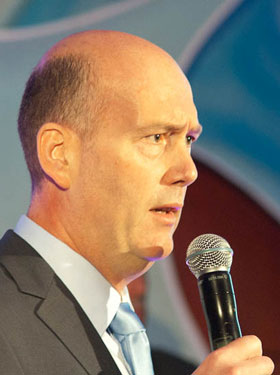
The West African Cable System (Wacs), the latest submarine cable to land on African shores, has arrived, offering SA operators 500Gbit/s of capacity at launch.
The system, which has a design capacity of 5,1Tbit/s, makes use of both 10Gbit/s and 40Gbit/s technology on different segments and will provide connectivity for countries right along Africa’s western coastline. It’s the first direct connection for Namibia, Togo, Congo-Kinshasa and Congo-Brazzaville.
Adrian Moss, chairman of the Wacs management committee, says the cable was originally meant to go live in 2011, but that this was impossible due to legislative changes, civil unrest and other unforeseen circumstances in some of the nations involved in the project.
The cable has been undergoing final testing in recent weeks, but officially went live at noon on Friday.
Wacs is based on a consortium model that includes 14 stakeholders and represents a joint effort between African and global telecommunications operators. The total investment in the system amounts to more than $650m and consists of more than 14 500km of submarine fibre-optic cable.
The cable consists of four fibre pairs and includes what Moss calls “GMPLS intelligent protection” to bolster resilience, stability and efficiency. Alcatel-Lucent is the turnkey supplier for the project.
The cable links to Western Europe and the US at a carrier-neutral point-of-presence in London. From there, it lands in Portugal, the Canary Islands, the Cape Verde Islands and runs down the west coast of Africa to the Yzerfontein landing station north of Cape Town.
Moss says Wacs “complements other systems in the region” and isn’t just about competing with them but about also providing redundancy for them.
“The sheer volume of capacity now being delivered will contribute to further fostering broadband development, giving impetus to African economies and helping to increase the standard and quality of life of its citizens,” he says.
Neotel GM of strategic business development Angus Hay says that latency tests on the Wacs system carried out earlier this year from the Yzerfontein in SA to Highbridge in the UK measured a round trip delay of 138,5ms, the lowest achieved so far over such a transoceanic distance.
The members of the Wacs consortium are Angola Cables, Broadband Infraco, Cable & Wireless Worldwide, Cabo Verde Telecom, Congo Telecom, MTN, Portugal Telecom, SCPT in the Democratic Republic of Congo, Togo Telecom, Tata Communications, Neotel, Telecom Namibia, BTC, Telkom, Vodacom and Vodafone Spain.
It’s hoped that the cable will encourage Internet service providers to reduce broadband costs for consumers while also improving speeds. “Wholesale reductions have happened in the SA market,” says Hay. “There’s no doubt that value has gone up and prices have come down in recent years.”
He says challenges remain around terrestrial connectivity, competition in the SA market, wholesale pricing and consumer access, but he nevertheless sees Wacs as a further step towards providing SA and African Internet users with world-class connectivity. — (c) 2012 NewsCentral Media




